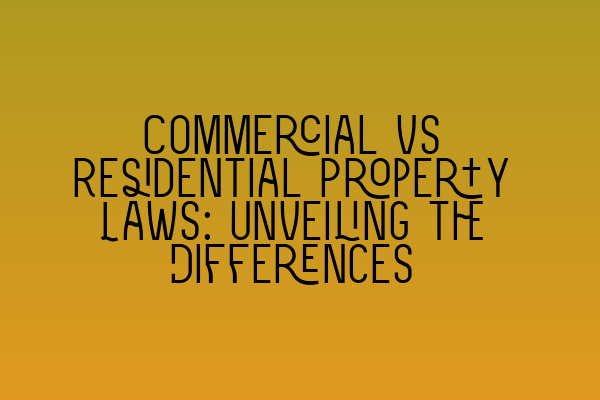Commercial vs Residential Property Laws: Unveiling the Differences
When it comes to property law, there are various types of properties that require different legal considerations. Two of the most common categories are commercial and residential properties. While they share some similarities, there are distinct differences in the laws and regulations governing these types of properties. In this article, we will delve into the key disparities between commercial and residential property laws, shedding light on important aspects that property owners and legal professionals should be aware of.
1. Definitions and Purpose:
Let’s start by clarifying the definition and purpose of commercial and residential properties. Commercial property refers to buildings or land that are primarily used for business or profit-generating activities. This can include retail stores, offices, warehouses, and industrial facilities. On the other hand, residential property is used primarily for dwelling purposes, such as single-family homes, apartments, and condominiums.
Understanding the purpose of each type of property is crucial, as it sets the foundation for the different legal considerations that apply to them. Commercial properties involve business transactions and contracts, while residential properties focus on providing a safe and comfortable living environment.
2. Planning and Zoning:
The planning and zoning regulations for commercial and residential properties vary significantly. Local authorities have specific laws in place to control the use and development of properties in different areas.
Commercial properties may face stringent zoning regulations, ensuring that they are located in appropriate areas designated for commercial activities. This helps maintain the balance between residential and commercial areas and prevents the negative impacts that commercial activities might have on residential neighborhoods.
Residential properties, on the other hand, are subject to different planning and zoning rules. The emphasis here is on creating livable communities, with considerations for factors such as building density, green spaces, and amenities that contribute to a high quality of life for residents.
3. Contracts and Lease Agreements:
Contracts and lease agreements are integral parts of both commercial and residential property transactions. However, the terms and complexity can differ significantly between them.
Commercial lease agreements tend to be lengthier and more detailed than residential leases. They often involve negotiations between landlords and tenants regarding terms, such as the length of the lease, rental rates, maintenance responsibilities, and any permitted commercial activities. Legal professionals working in commercial property law need to have a comprehensive understanding of these complexities to ensure fair and enforceable agreements for their clients.
Residential lease agreements, on the other hand, are generally more standardized and regulated by specific residential tenancy laws. These laws aim to protect the rights and well-being of tenants, covering areas such as rent increases, eviction procedures, and tenant obligations. It is crucial for property owners and tenants to be aware of their rights and responsibilities under these laws to maintain a fair and harmonious living environment.
4. Financing and Property Tax:
Commercial and residential properties have different financing structures and property tax considerations. Understanding these distinctions is essential for property owners and investors.
Commercial properties often require substantial financing due to their higher purchase prices and potential revenue generation. Commercial property loans typically have different terms and interest rates compared to residential mortgages. It is important for property owners and investors to work with financial professionals who specialize in commercial property financing to secure the best options available.
Property taxes for commercial and residential properties are calculated differently. Commercial properties are usually taxed based on their assessed value, while residential properties may have different tax rates and exemptions. Keeping up with local tax regulations and seeking professional tax advice is crucial for property owners to ensure compliance and optimize tax liability.
5. Legal Disputes and Remedies:
Legal disputes may arise in both commercial and residential property matters. However, the nature of these disputes and the available remedies can differ significantly.
Commercial property disputes often involve breach of contract, lease disagreements, property damage claims, or partnership disputes. These cases often require a thorough understanding of contract law, business law, and dispute resolution mechanisms. Engaging legal professionals experienced in commercial property law is essential to protect the rights and interests of all parties involved.
Residential property disputes, on the other hand, can include issues such as landlord-tenant disputes, eviction proceedings, housing discrimination, or property maintenance disputes. Residential tenancy laws provide specific processes and remedies for these disputes, aiming to protect the rights of both landlords and tenants. Expertise in residential property law is crucial for legal professionals dealing with residential property disputes to ensure fair and just resolutions.
In conclusion, commercial and residential property laws are distinct entities with their own set of regulations and considerations. Understanding these differences is crucial for property owners, investors, and legal professionals working in property law. By recognizing the variances in planning and zoning, contracts and lease agreements, financing, property tax, and legal disputes, stakeholders can navigate the complexities of commercial and residential property transactions more effectively and ensure compliance with the applicable laws.
For more information on property law and related topics, check out the following articles:
– SQE 1 Practice Exam Questions
– SQE 1 Practice Mocks FLK1 FLK2
– SQE 2 Preparation Courses
– SQE 1 Preparation Courses
– SRA SQE Exam Dates
At SQE Property Law & Land Law, our team of expert solicitors specializes in commercial and residential property matters. Contact us today for professional legal advice and assistance in navigating the intricacies of property law.
